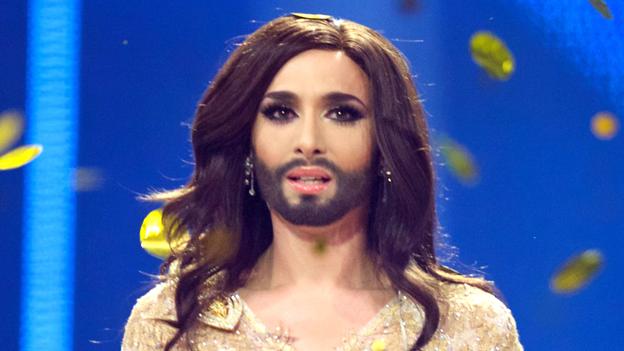There’s an unhappy phrase – possibly apocryphal, but enduring – attributed to the French diplomat Jean Monnet, the spiritual father of the European Union. “If I were to do it again from scratch,” Monnet supposedly said about the project of continental unity, “I would start with culture.” Whether or not he ever uttered those words, they have come back with a vengeance over the last five years, as the Euro has cratered, half a dozen national economies have been pushed to the brink of default, and far-right parties have gained power in countries including France and Finland. In good times, Europe’s politicians talked a big game about unity and brotherhood. When the going got rough, they have been more than happy to let Greece crumble rather than stand together.
And yet this week 180 million Europeans are set to bask in the glory of Europe. The Eurovision Song Contest, taking place in Vienna this year, has grown from a plucky seven-nation sing-off into the world’s largest non-sporting event this side of CCTV’s Chinese new year gala. In this 60th anniversary year the celebrations have extended all the way to Australia, a Eurovision-obsessed country that has been given a wild card to compete this year. It is enormous, Eurovision, and if all you hear is schlocky pop, you are not listening closely enough.
I’m not European, and usually my musical tastes run more to Alban Berg than ABBA. But I have been watching Eurovision for more than a decade now, starting when I watched a grainy livestream of the event from Estonia in 2002. Over the years I have come to believe that the Eurovision Song Contest, more than any other institution, offers the best possible model for the construction of a new Europe. More than football, more than Erasmus, more than Skype and Easyjet, Eurovision proposes how Europe can work: as somewhere modern, joyous, accepting of the East, tolerant of Muslims and immigrants, proud of difference and yet proudly united. With the EU locked in existential crisis, an already beloved model for Europe will be on display in Vienna this week, confetti and all.
This is not bloviating, and this is not clickbait – this is a serious proposal. If Europe really wants to build a common future, bearded divas are a good place to start.
Come together
Like almost everything with the prefix euro-, the Eurovision Song Contest has its roots in the aftermath of World War Two. In 1955 the young European Broadcasting Union, a consortium of national broadcasters, conceived of a single programme across multiple networks, transmitted simultaneously across borders. They found a model in the newly founded San Remo Festival, and created a musical celebration that pitted seven countries against one another in a friendly competition in which national pride would go hand in hand with European solidarity. (The BBC was a founding member of the European Broadcasting Union, but the UK did not participate in the first Eurovision – they missed the deadline.)
